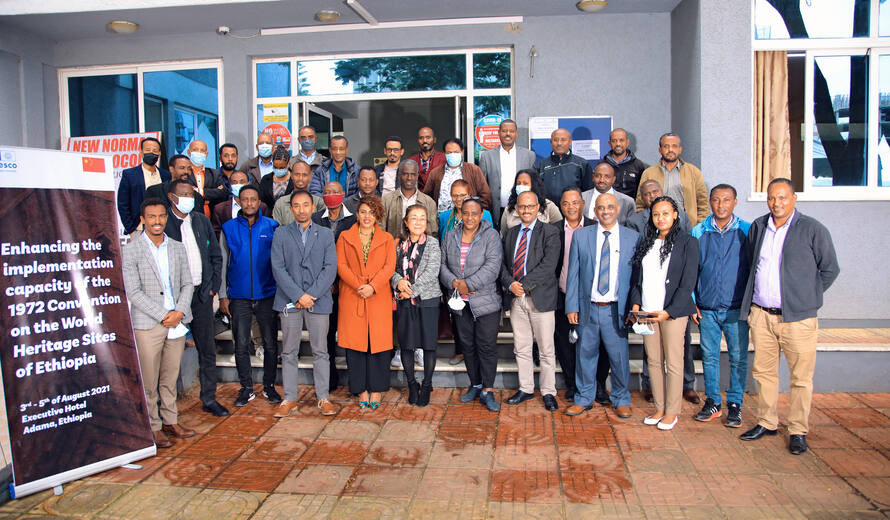Training workshop for “enhancing the implementation capacity of the 1972 Convention at World Heritage sites” organized in Ethiopia
UNESCO Addis Ababa Liaison Office in collaboration with the World Heritage Centre (WHC) and financial support from the People’s Republic of China, organized a Training workshop on “enhancing the implementation capacity of the 1972 World Heritage Convention ” which took place from 3 to 5 August 2021, in Adama Town, Ethiopia. The meeting brought together 43 participants from ministries and institutions that are stakeholders for the protection of cultural and natural heritage properties.
“With nine World Heritage sites, Ethiopia is rich in outstanding cultural and natural heritages. The diversity of the Ethiopian heritage is essential which could be a foundation for growth, innovation and living in peace,” said Dr Yumiko Yokozeki, the Director of the UNESCO Liaison Office in Addis Ababa. The organization of this national workshop was a response to the need for the State Party of Ethiopia to create a National Heritage Committee with high level and expert composition representing both natural and cultural world heritage institutions to monitor and implement national goals and activities within the national action plan.
“This workshop helps us to implement the roadmap for the implementation of the World Heritage Convention which eventually creates an opportunity to tap the advantages that our cultural and natural heritages can offer,” said H.E. Dr Hirut Kassaw, Minister of Culture, Tourism and Sport, while the State Minister H.E. Mrs Bizunesh Meseret, expressed the need to have a National Committee and to strengthen the National Commission for maximizing the benefit of the community and enhance collaboration between cultural and natural heritage institutions.
During the workshop, participants discussed the composition and the functions of the new Ethiopian National Heritage Committee and approved its status. Mr Muhammad Juma Muhammad, Chief of the Africa Unit of the UNESCO WHC highlighted the“urgency for African States Parties to integrate Heritage in their agenda for national development” and the “importance of having a high level National Committee or Board, which will bring together both cultural and natural heritage institutions to discuss issues affecting the country’s World Heritage sites”.
H.E. Dr Tilaye Gete from the Permanent delegation of Ethiopia to UNESCO gave a presentation on UNESCO and its role for peacebuilding processes through Education, Science, Culture, Communication, Social and Human Sciences. Mr Girma Timer and Ms Tsehay Eshetie, Focal Persons for Natural and Cultural sites in Ethiopia, both stressed the following significant points: proper management for the protection of cultural and natural World Heritage properties in Ethiopia, the enhancement of the conservation and protection of the Outstanding Universal Value (OUV) and increasing stakeholder and community participation through empowerment for sustainable development.
During the session, the participants identified, understood, and internalized the decisions of the World Heritage Committee on World Heritage properties in Ethiopia in view of preparing an Action Plan for funding. They also provided examples of successful implementation of World Heritage Committee's decisions on conservation and governance especially addressing threats that could lead to Danger Listing of the properties.
“Balancing heritage conservation and development needs is one of the most challenging tasks for World Heritage conservation in Africa,” said Enathe Hasabwamariya, Associate Programme Specialist at the Africa Unit of the WHC. “African States Parties should be aware of tools developed by the WHC and Advisory Bodies to support management effectiveness, including monitoring and evaluation of OUV, as well as existing mechanisms that can support the protection of World Heritage properties, such as technical advice from Advisory Bodies and financial support from the World Heritage Fund (e.g. International Assistance).”
The workshop ended by forming a committee comprising of senior experts to incorporate agreed points and finalize the MoU that will be signed by identified ministries and institutions. Closing remarks given by Mr Donatius Kamamba, a resource person and consultant who led the workshop deliberation for the creation of the National Heritage Committee for Ethiopia.
